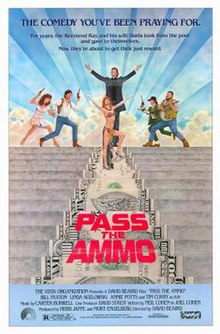Pass the Ammo
| Pass the Ammo | |
|---|---|

Theatrical release poster by Tom Jung
|
|
| Directed by | David Beaird |
| Produced by | Mort Engelberg |
| Written by |
Joel Cohen Neil Cohen |
| Starring |
Bill Paxton Linda Kozlowski Annie Potts Tim Curry |
| Music by | Carter Burwell |
| Cinematography | Mark Irwin |
| Edited by | Bill Yahraus |
|
Production
company |
The Vista Organisation
|
| Distributed by | New Century Vista Film Company |
|
Release date
|
|
|
Running time
|
93 minutes |
| Country | United States |
| Language | English |
| Box office | $169,785 |
Pass the Ammo is a 1988 American comedy film starring Bill Paxton, Annie Potts, Linda Kozlowski and Tim Curry. The film is a spoof of televangelism released right after the real-life Jim Bakker and Jimmy Swaggart scandals. The movie's working title during production, "...And Pass the Ammunition," references the phrase "praise the Lord and pass the ammunition."
Curry is the Rev. Ray Porter, who runs a Pentecostal faith healing and televangelism empire based in Arkansas. A small group of stereotypical rednecks, one of whom was bilked out of her inheritance by Rev. Porter's ministry and another of whom just got out of prison, try to rob Porter's ministry. A series of wrong turns inside the church during the robbery leads the robbers onstage right in the middle of a broadcast, and the three robbers turn what was supposed to have been "just" a robbery into a hostage situation.
During the hostage negotiations, a series of snowballing scandals involving the ministry come to light. The robbery, hostage taking, and scandal revelations are all broadcast live over satellite television as locals gather in bars to watch. Rev. Porter and the robbers develop a rapport during the hostage situation that resembles shop talk among thieves, as they discuss the best ways of investing stolen money.
One comic subplot involves the Christian network's producer, a drug-addled electronics wizard named Stonewall who decorates his workspace with Pink Floyd posters, but was hired by the network because "he has found the Lord...he told us so himself."
Another subplot involves a local sheriff, himself also an archetypal redneck whose duck hunting trip was interrupted by the incident, who seems to sympathize with the would-be robbers. The film is partly about his moral struggle in trying to enforce the law when his sympathies lie elsewhere. He just wants to see the situation end with nobody getting hurt, and butts heads with the network's owner and federal agents who demand harsher action.
...
Wikipedia
